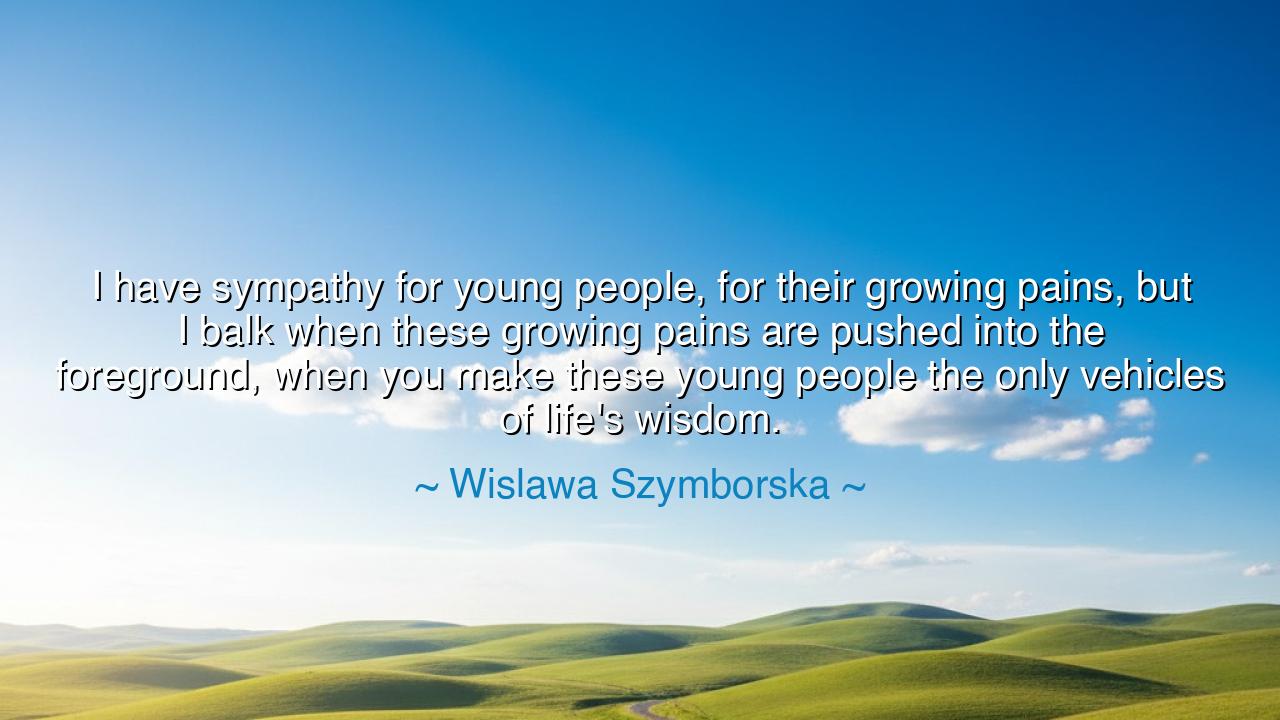
I have sympathy for young people, for their growing pains, but I
I have sympathy for young people, for their growing pains, but I balk when these growing pains are pushed into the foreground, when you make these young people the only vehicles of life's wisdom.






When Wislawa Szymborska declared, “I have sympathy for young people, for their growing pains, but I balk when these growing pains are pushed into the foreground, when you make these young people the only vehicles of life’s wisdom,” she was offering not scorn for youth, but balance, a reminder that wisdom is not born whole in the fires of adolescence alone. Her words are filled with tenderness for the struggles of the young, yet also with caution, lest society forget the long years, the tested experience, and the slow ripening that true wisdom demands.
The origin of her insight lies in her own long life as poet and witness. Szymborska had seen war, tyranny, and human folly, and she knew that life is not captured fully in the tears and triumphs of youth. While the growing pains of the young are real—awkward, passionate, overwhelming—they are not the final shape of truth. For wisdom is not only the storm of becoming, but also the calm of endurance, the patience of age, the humility of having erred and learned. Thus, she gives sympathy to the struggle of youth, but she warns us not to mistake the voice of the young for the only voice of life.
History, too, gives us this lesson. Consider the tale of Alexander the Great, who as a young man conquered vast empires, filled with the fire and brilliance of youth. His deeds inspired awe, yet he died at thirty-two, leaving behind not a stable kingdom but chaos and division. In contrast, think of Cato the Elder of Rome, who in his long years counseled patience, frugality, and endurance. One dazzled with youthful flame; the other endured with seasoned wisdom. Neither should be ignored, but Szymborska would remind us that the world errs when it crowns youth as the sole vessel of truth, forgetting the depth that comes only with time.
Her words also remind us of a paradox: society often glorifies the freshness of youth, its new ideas, its raw emotions, while dismissing the insights of age as tired or outdated. Yet Szymborska turns this upside down. She does not deny the value of youth, but she urges us to see that every stage of life bears its own wisdom. The young offer boldness, questions, and beginnings; the old offer steadiness, perspective, and the weaving of patterns seen only across decades. To silence either is to lose half the truth.
The lesson here is profound: do not make idols of youth, nor dismiss its struggles, but place it within the larger story of life. A culture that worships only the voice of the young becomes shallow, chasing novelty and ignoring endurance. A culture that silences the young becomes brittle, blind to renewal. True balance honors both—the fire of youth and the depth of age, the raw cry of becoming and the seasoned voice of having lived.
What, then, should you do? First, if you are young, embrace your growing pains but hold them with humility, knowing they are part of the journey, not its end. Second, if you are older, do not scorn youth, but offer your wisdom as a gift, so that their struggles may be met with






AAdministratorAdministrator
Welcome, honored guests. Please leave a comment, we will respond soon